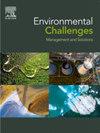采用保护性农业做法及其对产量和收入的影响:来自越南西北山区玉米小农的证据
Q2 Environmental Science
引用次数: 0
摘要
农民的生计和环境可持续性是越南农业的关键问题,在越南,集约耕作和过度使用化学投入等传统做法导致了土壤退化。保护性农业作为改善土壤健康、提高生产力和增加农业收入的可持续解决方案已得到推广。然而,对越南cap的采用和影响的研究仍然有限。本研究旨在确定采用cap的决定因素,并评估其对越南西北山区玉米产量和净收入的影响。该分析基于对400个玉米农户的调查数据。采用多项内生转换回归(MESR)框架来解决选择偏差。研究结果表明,户主的教育程度、总耕地面积、农民获得信贷的机会、与推广机构的互动、cap培训、与合作社的接近程度、参加农民小组以及特定地块的特点都有助于共同采用cap。影响分析表明,单独或联合采用cap可显著提高玉米产量和净收入。当多个实践同时实现时,好处是最明显的,强调了cap的协同效应。这些结果表明,在该地区应优先促进共同农业政策的综合采用。建议政策制定者和发展从业者将重点放在改善获得信贷的机会、加强推广服务、扩大有针对性的培训项目、促进农民团体的形成以及提高农民对其农田特征和cap益处的认识上。本文章由计算机程序翻译,如有差异,请以英文原文为准。
Adoption of conservation agriculture practices and its impacts on yields and incomes: Evidence from smallholder maize farmers in the Northwest mountainous region of Vietnam
Farmers' livelihoods and environmental sustainability are critical concerns in Vietnamese agriculture, where conventional practices such as intensive tillage and excessive use of chemical inputs have led to soil degradation. Conservation agriculture practices (CAPs) have been promoted as a sustainable solution to improve soil health, enhance productivity, and increase farm income. However, research on the adoption and impacts of CAPs in Vietnam remains limited. This study aims to identify the determinants of CAPs adoption and assess its impacts on maize yields and net income in the Northwest mountainous region of Vietnam. The analysis is based on survey data from 400 maize-farming households. A multinomial endogenous switching regression (MESR) framework is employed to address selection bias. The findings indicate that the joint adoption of CAPs is facilitated by education of the household heads, total farmland area, farmers’ access to credit, interactions with extension agents, training on CAPs, proximity to cooperatives, participation in farmers' groups, and plot-specific characteristics. The impact analysis reveals that adopting CAPs—either individually or in combination—significantly improves maize yields and net income. The benefits are most pronounced when multiple practices are implemented simultaneously, underscoring the synergistic effects of CAPs. These results suggest that promoting the combined adoption of CAPs should be prioritized in the region. Policymakers and development practitioners are advised to focus on improving access to credit, strengthening extension services, expanding targeted training programs, fostering the formation of farmer groups, and raising farmers' awareness of their farmland characteristics and the benefits of CAPs.
求助全文
通过发布文献求助,成功后即可免费获取论文全文。
去求助
来源期刊

Environmental Challenges
Environmental Science-Environmental Engineering
CiteScore
8.00
自引率
0.00%
发文量
249
审稿时长
8 weeks
 求助内容:
求助内容: 应助结果提醒方式:
应助结果提醒方式:


